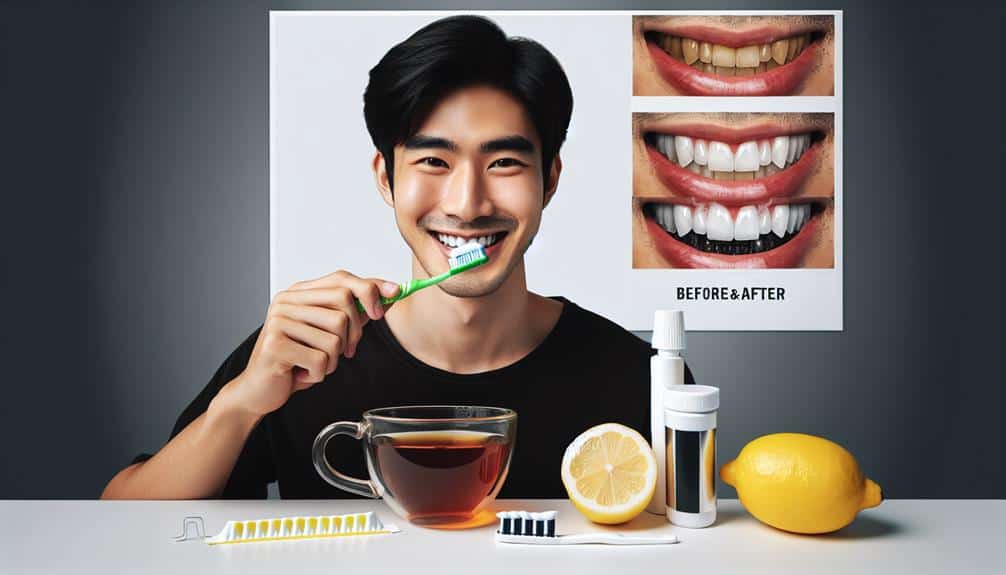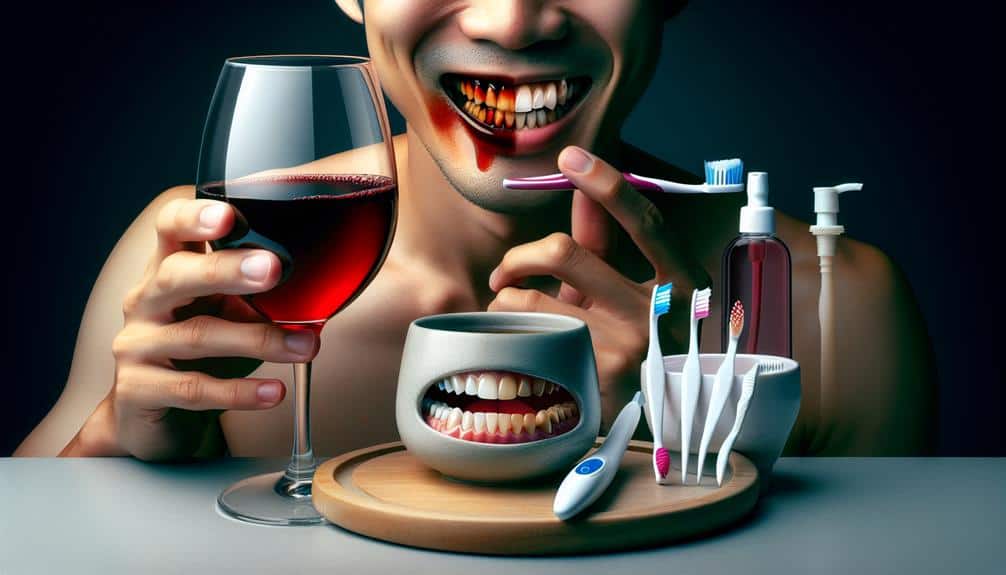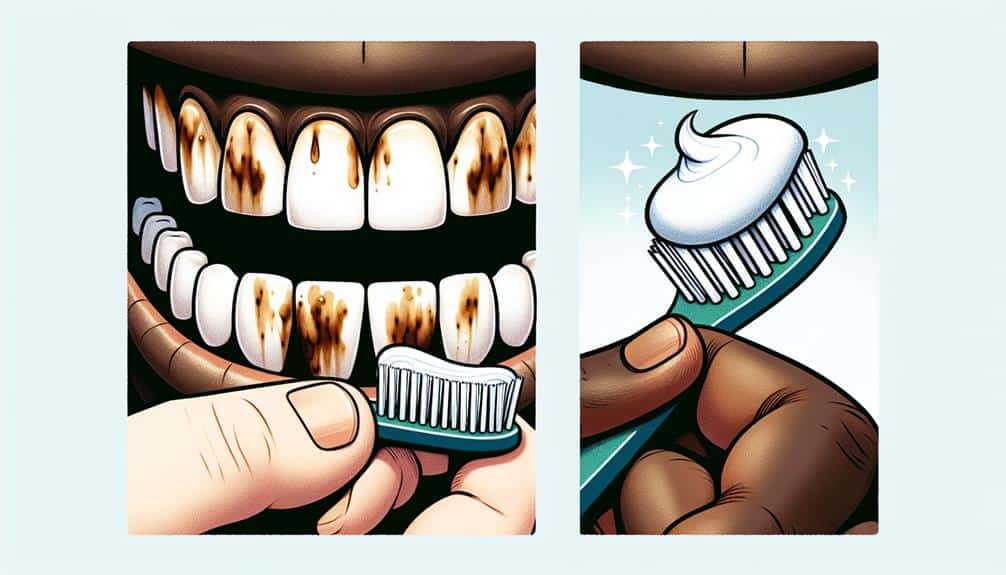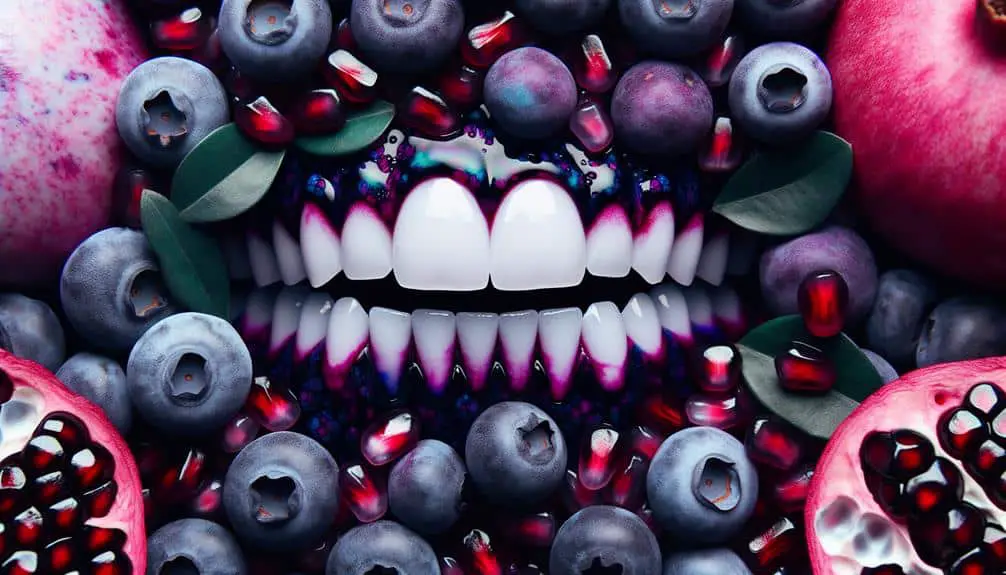To reverse yellowing teeth from black tea, you should try rinsing your mouth with water after consuming tea to wash away the tannins that cause stains. Drinking water alongside tea and using a straw can also prevent further discoloration. Additionally, implementing DIY treatments like baking soda or hydrogen peroxide can help brighten your teeth. Lifestyle changes like quitting smoking and maintaining good oral hygiene are essential in preventing and reversing yellowing caused by black tea. These strategies combined with preventive measures can effectively restore your teeth's brightness and whiteness, giving you a confident smile.
Key Points
- Rinse mouth with water after black tea to wash away tannins binding to teeth.
- Use preventive measures like drinking water alongside tea to reduce staining effects.
- Maintain good oral hygiene with regular brushing and flossing to prevent further yellowing.
- Consider professional whitening treatments or DIY remedies like baking soda to whiten teeth.
- Limit consumption of dark beverages to prevent future discoloration from black tea stains.
Understanding Black Tea Stains
To understand how black tea stains your teeth, it's important to explore the composition of this popular beverage. Black tea contains tannins, which are a type of polyphenol that can lead to teeth staining. Tannins have a strong affinity for proteins, which are present in abundance in your teeth. When you consume black tea, these tannins can bind to the proteins on the enamel surface, resulting in unsightly stains over time.
Preventing stains caused by black tea consumption can be achieved through various dietary habits. One effective way is to drink water alongside your tea. Rinsing your mouth with water after consuming black tea can help wash away some of the tannins before they've a chance to adhere to your teeth. Additionally, using a straw when drinking black tea can minimize the contact between the tea and your teeth, reducing the risk of staining.
Being mindful of these preventive measures and dietary habits can help mitigate the staining effects of black tea on your teeth.
Effective Ways to Whiten Teeth
Curious about how to effectively whiten your teeth and reverse discoloration caused by black tea? There are several evidence-based methods you can try to brighten your smile:
- DIY treatments: Utilize natural remedies like baking soda and hydrogen peroxide to create homemade whitening solutions. These can help remove surface stains and brighten your teeth effectively.
- Professional whitening treatments: Consider visiting a dentist for professional teeth whitening procedures. They can provide stronger whitening agents that deliver quick and noticeable results.
- Lifestyle changes: Make adjustments like cutting down on dark beverages, quitting smoking, and maintaining good oral hygiene practices. These lifestyle changes can prevent further staining and help maintain your newly whitened teeth.
Preventing Future Discoloration
To maintain the brightness of your teeth after whitening, implementing strategies to prevent future discoloration is essential. Consistent oral hygiene habits play a vital role in preserving the whiteness of your teeth. Brushing your teeth at least twice a day with a fluoride toothpaste and flossing daily can help remove plaque and prevent staining. Additionally, using a mouthwash can further assist in reducing bacteria that can lead to discoloration.
Making lifestyle changes can also contribute to maintaining the whiteness of your teeth. Avoiding foods and beverages that are known to stain teeth, such as black tea, coffee, and red wine, can prevent further discoloration. If you do consume these items, consider using a straw to minimize contact with your teeth. Quitting smoking can greatly improve the color of your teeth and overall oral health.
Natural Remedies for Brighter Teeth
Implementing natural remedies can be an effective way to enhance the brightness of your teeth and achieve a healthier smile. When looking to brighten your teeth naturally, consider the following DIY remedies and lifestyle changes:
- Oil Pulling: Swishing coconut oil in your mouth for about 15-20 minutes daily can help remove plaque and bacteria that may contribute to discoloration.
- Baking Soda Paste: Mixing a small amount of baking soda with water to form a paste and brushing your teeth with it once a week can help scrub away surface stains gently.
- Apple Cider Vinegar Rinse: Diluting apple cider vinegar with water and using it as a mouthwash for a few seconds before rinsing can help whiten teeth due to its natural bleaching properties.
These simple and natural methods, when used consistently and in conjunction with good oral hygiene practices, can contribute to a brighter smile over time. Remember to consult with your dentist before trying any new DIY remedies to make sure they're suitable for your dental health.
Professional Whitening Options
When considering professional whitening options for your teeth, consult with your dentist to determine the most suitable treatment plan. Two common professional whitening options include laser treatment and bleaching trays.
Laser treatment is a popular choice for those seeking quick and effective results. During this procedure, a bleaching agent is applied to your teeth, and then a laser is used to activate the whitening process. This method is known for its ability to whiten teeth several shades in just one session. Additionally, laser treatment is gentle on the teeth and offers enamel protection, making it a safe option for most individuals.
On the other hand, bleaching trays are custom-made trays that you wear at home. You fill these trays with a whitening gel and wear them for a specified amount of time each day. While this method may take longer to show results compared to laser treatment, it tends to provide more long-term results. The bleaching trays can be reused for touch-ups, maintaining your bright smile over time. Consulting with your dentist will help you choose the best option based on your individual needs and goals.
Frequently Asked Questions
Can Black Tea Stains Be Removed With Regular Toothpaste and Brushing?
Yes, black tea stains can be removed with regular toothpaste and brushing, but for deeper stains, consider baking soda or whitening strips. Proper brushing techniques can help combat yellowing. Consistent oral care is key.
How Long Does It Typically Take to See Results From Natural Remedies for Whitening Teeth?
When trying natural remedies for whitening teeth, results vary. Typically, you'll notice changes within a few weeks of consistent use. The effectiveness of these remedies in reversing yellowing teeth depends on the cause and the prevention measures you undertake.
Are There Any Specific Foods or Drinks That Should Be Avoided to Prevent Yellowing Teeth?
To prevent yellowing teeth, avoid foods and drinks that stain, like coffee and red wine. Opt for teeth-friendly options like water and dairy products. Consider whitening options for a brighter smile and maintain good oral hygiene for preventive measures.
Can Using a Whitening Toothpaste Alone Effectively Remove Black Tea Stains?
You may find that using a whitening toothpaste alone doesn't entirely remove tough black tea stains. For more effective results, consider incorporating whitening strips or seeking professional whitening treatments, but be aware of associated costs.
Are There Any Specific Dental Conditions That May Make It More Difficult to Whiten Teeth With At-Home Remedies or Professional Treatments?
Certain dental conditions like enamel erosion, receding gums, or tooth sensitivity can impact the effectiveness of whitening treatments. Before starting any whitening regimen, consult with a dentist to address these conditions for better results.



